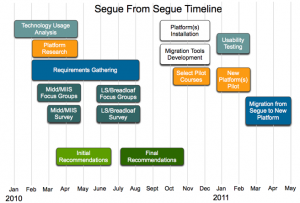The Curricular Technology team in its review of course and curricular sites has identified a number of faculty who have been particularly innovative in their use of technology. The team has had informal conversations with many of these faculty but wanted to try to bring at least some of them together to show us how they are using technology and to tell us what they need. So the team organized a session last week and invited five faculty members to present their work and discuss their needs. Based on these presentations we have identified some of the functional requirements for innovators.
Chemistry course site in Facebook (Jeff Byers)
Carrie MacFarlane interviewed Prof. Byers last summer and documented his use of Facebook for large lecture courses on the Teaching with Technology blog. Prof. Byers is generally skeptical of “course management systems.” He certainly doesn’t think of himself as the “course manager” and he sees more value in students learning by collaboration rather then coming to him with all their questions. He chose Facebook because students were already familiar with it and were comfortable using it for sharing.
Inter-institutional Collaboration (Hector Vila)
Prof. Vila discussed his use of Segue for teaching Midd students how to teach writing to high school students. Because of the need to ensure the privacy of student-created content and also provide Midd students access to the work of high school students they were mentoring, clearly defined access control was critical. Segue did a reasonably good job of this, though defining the roles for students was a time consuming process. Also challenging was setting up and managing user accounts for students from two different high schools.
Student Video Assignments (Enrique Garcia)
Prof. Garcia requires his students to make videos as a way to practice their Spanish and hear themselves speaking. He allows his students to chose the topics for their videos and teaches them how to edit their work with iMovie. Generally he has found that his students enjoy making these videos and that the work seems to engage them and keeps them using the language more.
Prof. Garcia has distributed some of this work on YouTube but would prefer a service such as MiddMedia so that he could upload longer and higher quality student videos and be able to better control access. While Prof. Garcia has taught students how to edit videos himself, he would appreciate more support for this.
Internet Art (Hope Tucker)
Prof. Tucker teaches a course on internet art in which she introduces students to a wide range of technologies including twitter, social bookmarking and wikis. Like Prof. Vila , access control is important for this work because students are more expressive and experimental when they know access to their work is limited to the class.
Prof. Tucker has found that having MediaWiki sites restricted to her class to be particularly useful. These sites enable her students to collaborate on projects and MediaWiki’s history display allows her to track all the contributions to a given project by individual students so she is able assess their work. MediaWiki also provides a space for students to refine their work before later posting to Wikipedia.
For her Internet Art class, Prof. Tucker requires her students to “create a work that investigates emergent forms of media.” For this project, she teaches her students how to create basic web sites using Adobe Dreamweaver because it is particularly important for her course that her students be able to create their own design. That said, Prof. Tucker would consider letting students use content management systems such as WordPress, Segue or MediaWiki if students could edit the CSS of the template files for these platforms.
Web -based Audio Recording (Roberto Veguez)
Prof. Veguez noted a significant shortcoming in our current technology offerings. In the past, the Sunderland Language Center had a number of booths where students could listen to audio recordings on audio cassettes and record themselves saying what they heard and then be able to compare their pronunciation with what they heard. These language booths are no longer available and we do not have adequate replacement for them.
Students can record themselves using tools like Audacity. However setting Audacity up in a way that allows them to easily record themselves repeating language they hear from a website is a bit more challenging. Some sort of web-based audio recording tool that could be placed on the same page as the audio file they are listening to could make exercise much easier.
Other language faculty have expressed interest in web-based audio recording tools for assignments and assessment. Currently students do audio assignments using tools like Audacity to record and save audio files. However to then submit these recordings for assignments requires uploading the audio file to the course website or emailing to their instructor. Having a web-based recording tool means that students could access the assignment description on the course site and then record themselves from the same page and have that recording automatically saved to the site eliminating the need to upload it. Web-based recording tools would also be very useful for oral proficiency exams.
